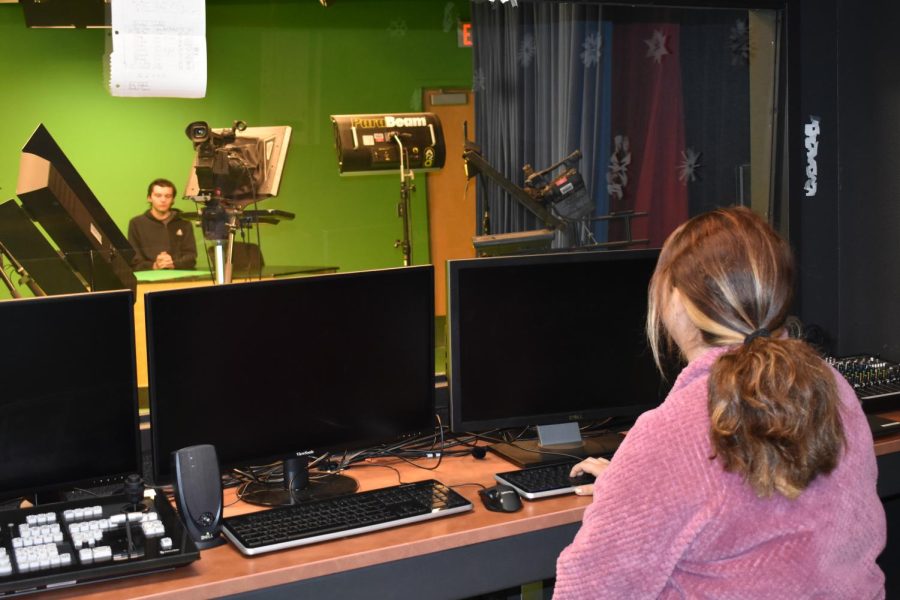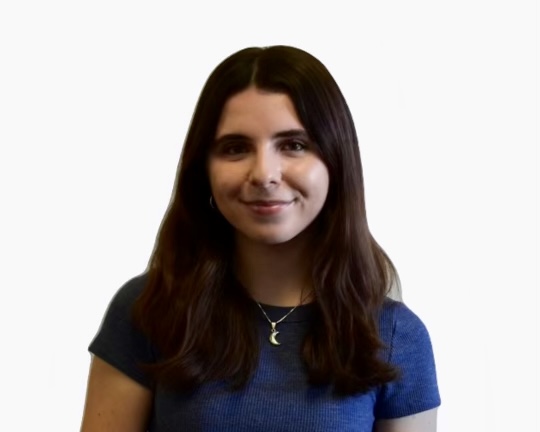What classes should I take next year?
Evan Day (back), sophomore, and Caroline Macias (front), senior, record the morning announcements in the Media Productions studio.
January 25, 2023
Media Productions
With videography skills becoming ever more important and desired in today’s online world, Media Productions is training students to be able to effectively and creatively produce media.
Media Productions allows students to see what it takes to create films and series within the entertainment industry. First-year students learn how to edit and enhance video clips with music and digital effects, oftentimes using their own clips.
“A lot of the first year [assignments are] project based where students do their own video editing,” Bzdak. “We cover safety, lighting, cameras, [and] microphones.”
Students are given the opportunity to work with the advanced equipment they learn about in the Media Productions studio. While gaining valuable skills and experience, students are also tasked with providing OHS with a useful video announcement each week.
“The second-year students are responsible for doing our video announcements,” Bzdak said. “[Students] gather all the information, they write their script, they film, and then they edit it into a cohesive.”
Accounting
While utilizing desirable business platforms such as Excel and Quickbooks, Accounting teaches students the skills they need to be familiarized with effective personal finance and budgeting techniques.
This three-year program provides an environment to master these financial lessons, learning more advanced concepts throughout every step of the course. Through this, Accounting provides opportunities for students regardless of the field they are interested in.
“No matter what career or industry you want to go into, there are accountants there. So even if you don’t want to be an accountant, you’re going to have to work with accountants and with their software, so being able to understand that lingo, how they do things…is really beneficial in every aspect of business,” said Tiffany Kurtz, Accounting teacher.
While the curriculum used in Accounting benefits all who take the class, a common misconception misleads students about the competencies needed for this course.
“Accounting is not math. If you can add, subtract, multiply, and divide, you have all of the math skills that you need and I’ll even let you use a calculator to do it,” Kurtz said.
AP Psychology
Through the exploration of thoughts, behaviors, and actions of people, AP Psychology allows students to discover the inner workings of a human’s motivations.
This biology-heavy Advanced Placement class explores the nervous system and brain anatomy in order to best provide an explanation for the behaviors of people.
“They are learning critical thinking skills; the ability to change perspectives, so empathy, putting themselves in somebody else’s shoes, social awareness, body language skills. Being aware if somebody is feeling anxious or happy. How to identify those small types of movements,” said Kristen Liptow, AP Psychology teacher.
Though the lessons being taught are all focused on preparing students for the national exam at the end of the year, there are immense benefits to being able to view the world through the lens of psychology.
“They can use pretty much anything that they learn in their personal life. When it comes to the fields, psychology can be applied widespread to any field that you go into. HR runs heavily on psychology in general…[students] can apply communication skills with their peers or coworkers,” Liptow said.
AP Seminar
Through the central focus on writing, researching, and presenting, AP Seminar strives to help students dive deeper into the development of these essential pieces of knowledge.
With the end goal of a composition of all their research into a portfolio, this class teaches students how to effectively utilize other writing strategies, in order to best represent the research, and connect it to a future profession.
“The benefits of this class are getting the practice of different types of writing, learning different types of citation, so [students] are really encouraged to explore beyond MLA…so it kind of lets them take skills that would be applicable to a profession and apply those to their research [that] they’re writing and presenting,” said Veronica Elton, AP Seminar teacher.
Another immeasurable benefit this class gives its students is the ability to look at the world in a different way, discovering the reasons behind certain research.
“One of the research skills is going to be more looking into bias. Looking into different lenses, and by lenses we were talking about like ‘is it a scientific lens, a political lens?’ And looking into different perspectives as well,” Elton said.
Computer Science
In the past 20 years the world has undergone a technological revolution. OHS strives to prepare students for this increasingly digital world by teaching students the in-and-outs of computers.
“We teach basic web design;, web design skills are very important wherever you go, and we teach all parts of programming, ” said Sini Thomas, Computer Science teacher.
This course prepares students for the demands of the job market. Computer science is a rapidly growing field that has been integrated into virtually every industry in the world. Day by day society is becoming more dependent on computers and technology and it is important for students to learn how to interact with it.
“Computer science is everywhere, right? If you want to take up a job, mostly they’re related to computers,” Thomas said. “Any kind of office job contains some background knowledge in computers. The more knowledge you have about computers in the current era, the better off you are because the chances of employment for you are much higher.”
Communication (Intro to Human Communication/COM 100)
Communication is a basic element in human life. This CTE course offered by OHS, enables students to master communication skills as they learn the best way to effectively talk to others..
From personal relationships, to the workplace and even the relationship between yourself, exemplary communication skills are vital. The course allows students to understand the importance of listening, speaking, observing, and emphasizing. They get the opportunity to develop these skills for future employers.
“Many employers require these soft skills. They’re looking for critical thinking, creativity, and definitely communication skills. It aids you in all aspects of your life,” said Cindy Garraway, Communications teacher.
The class is unique, as it teaches lessons students will continue to use for the rest of their lives.
“There’s no other course here on campus that can impact one’s life, both within their relationships, within their workplace, within their health. All of that contributes to a more meaningful life if you have good communication skills,” Garraway said.
Digital Communications
With journalism being more important than ever, students learn the intricacies of the field. The CTE course makes students read, write, and think like a journalist.
This two year program allows students to understand how to create a newspaper from scratch and the inner workings of the field. It also provides students with a great appreciation for the work of journalists.
“In our current world right now, journalists are some of the most important people out there. They deliver the truth; they should be unbiased; they are fair and impartial. We are able to know what is happening in the world because of these people,” said Cindy Garraway, Digital Communications teacher. “To be in that area and knowing what impact you’ve made on the world and the people around you is something that is definitely important.”
The class nurtures students’ love for writing, photography, and informing those around them.
“You can be the Nancy Wheeler of O’Connor, how cool is that? Knowing everything that’s happening and being involved, plus for college applications and scholarships you’ll have a built- in portfolio if you stay and take newspaper,” Garraway said.
AP Human Geography
Hosting a wide variety of agricultural practices, cultures, and terrains, Arizona contains many examples of what students can expect to learn about in AP Human Geography. With eight different units covering human patterns and processes, there is much to be gained by taking this course.
As an Advanced Placement class, students are taught using a rigorous curriculum that prepares them for a final exam administered by the College Board. Test-takers who score well can obtain college credit for the class.
“[In] Human Geography, we study how humans modify and adapt the environment around them,” said Tiffany Ellis, AP Human Geography teacher. “We also look at current events around the world in terms of how humans use land—especially in a modern setting.”
Through the Human Geography curriculum, students have the opportunity to learn and explore how and why humans across the globe have developed in the ways that they have.
“It’s a good class to talk about world events, [learn] why cultures are the way they are, [and learn] how we interact with the environment,” Ellis said. “We talk about the development of large urban areas and what they look like in the past, present, and future.”
Graphic Design
One of the most popular CTE courses offered by OHS, Graphic Design, enables students to learn how to express their creativity in a digital form. With a computer lab decked with Adobe software products at their disposal, students have many programs to explore.
“We take an entire semester for Illustrator, which is vector graphics, and then we go to the second semester with Photoshop, which is pixels instead of vectors,” said Patrick Bzdak, Graphic Design teacher.
Once students complete the introductory graphic design course, there are also advanced classes offered that allow students to participate in OHS’s school-run business, Eagle Ink. By completing several years of Graphic Design, and participating in internships, some students are able to take that experience and find employment—bypassing traditional routes of tertiary education.
“There are more and more companies that are hiring entry-level students out of high school, especially if they’re three or four year completers,” Bzdak said. “If you take three years of Graphic Design, [then on] the fourth year you can be an intern, and that can get you some viable experience in a company.”




